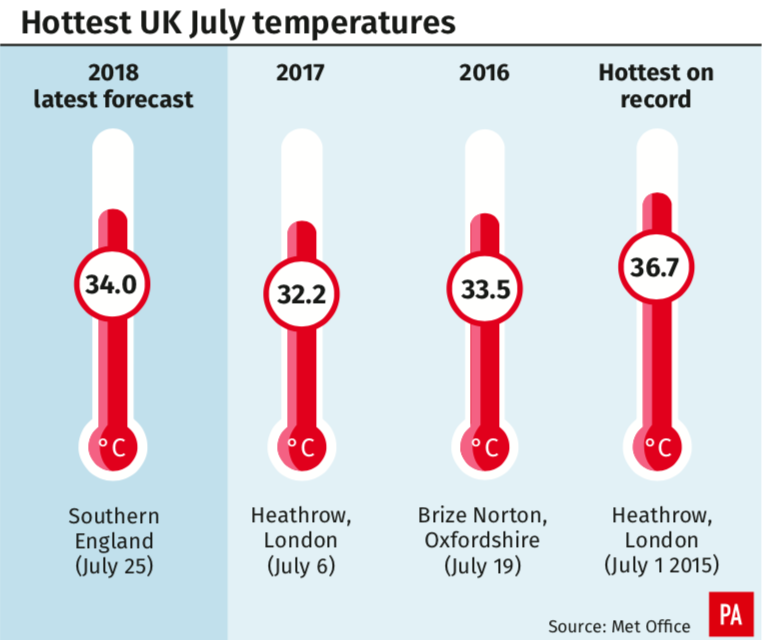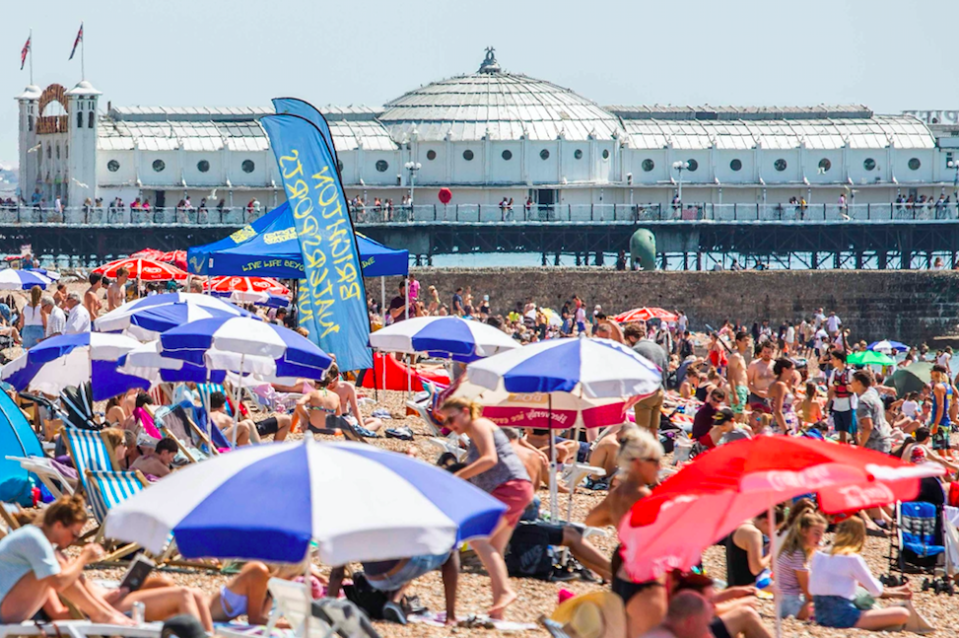Hottest day EVER? Heatwave temperatures could break all-time British record

Britain could bake in its hottest day EVER as the UK heatwave shows no sign of slowing down.
The current record of 38.5C (101.3F) was set on August 10, 2003 in Brogdale, Kent, but bookies Paddy Power have slashed the odds of that being broken from 10/1 in mid-June to 21/10 as the heatwave intensifies.
The bookmaker has also put the odds of temperatures exceeding 100F (37.7C) at 5/6, from the 2/1 price in mid-June.
However, a Met Office spokesman told Yahoo News UK that the chances of the all-time record being beaten currently stood at 20%.
He added that there was a 30% chance that the all-time July record – currently standing at 36.7C – would be broken.
Sun worshippers basked in the hottest temperature of the year so far on Monday, with a scorching 33.3C (92F) recorded in England, and the warmth is set to stay for the rest of the working week.


Parts of Britain could see temperatures rise to 35C (95F) towards the end of the week as the heatwave continues.
Temperatures hovered around 21C (70F) in parts of East Anglia and London past midnight, around the average July day time temperature for the region of 19-23C (66-73F) before dropping to around 18C (64F).
Monday’s 33.3C high was recorded at Santon Downham in Suffolk, but it is set to get even hotter, with temperatures expected to peak on Thursday and Friday.
MORE: Greece wildfires: At least 50 people killed and dozens injured at holiday resorts near Athens
MORE: The end of the great British pub? Three boozers closed down every DAY last year
Becky Mitchell, Met Office meteorologist, said temperatures of 35C were forecast for Thursday in East Anglia and London, adding: ‘There’s potential it could go even warmer than that.’
She said the climbing temperatures are due to warm air coming up from France combined with high pressure across the country.
A respite from the heat could come by the end of the week, when thunderstorms are expected in eastern areas.
Good morning. Today it is looking hot for Southern England, but feeling fresher further North. Check out the latest forecast here: https://t.co/lvmvtqQWBN ^Eilidh pic.twitter.com/XIQB5qSYZr
— Met Office (@metoffice) July 24, 2018

An amber ‘heat health watch’ warning has been issued for parts of England.
The amber, or level three, warning is issued when temperatures are predicted to hit 30C (86F) during the day, and 15C (59F) at night, for at least two consecutive days.
There is a 90% possibility of heatwave conditions between 9am on Monday and 9am Friday in parts of England, mainly in the south and east.’
The hottest July day on record is 36.7C (98F), which was reached at Heathrow on July 1, 2015.


The Met Office said several places have had 54 consecutive dry days, starting May 30, including a few which have had less than 1mm of rain in the entire 54-day period – the longest spell since 1969, when 70 days passed with no significant rainfall.
The longest run of days with no rain at all this summer so far is 48 days at Brooms Barn, near Bury St Edmunds, since June 5.
A spokesman said: ‘It’s the driest first half of the summer since 1961.
‘For the UK as a whole, we’ve only seen about 20% of the rainfall we’d normally expect throughout the whole summer. Parts of southern England have seen only 6%.’

 Yahoo News
Yahoo News 
